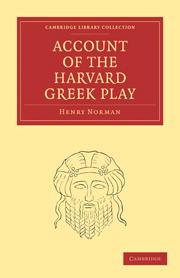Book contents
- Frontmatter
- Contents
- Illustractions
- PREFATORY NOTE BY PROFESSOR W. W. GOODWIN
- INTRODUCTION
- I THE ORIGIN OF THE PLAY
- II SOPHOCLES
- III “OEDIPUS THE KING”
- IV THE PREPARATION OF THE PLAY
- V THE PERFORMANCES
- VI IN RETROSPECT
- APPENDIX 1 THE CIRCULAR OF THE COMMITTEE
- APPENDIX 2 THE PROGRAMME
- APPENDIX 3 A BIBLIOGRAPHY OF THE PLAY
- Plate section
- Frontmatter
- Contents
- Illustractions
- PREFATORY NOTE BY PROFESSOR W. W. GOODWIN
- INTRODUCTION
- I THE ORIGIN OF THE PLAY
- II SOPHOCLES
- III “OEDIPUS THE KING”
- IV THE PREPARATION OF THE PLAY
- V THE PERFORMANCES
- VI IN RETROSPECT
- APPENDIX 1 THE CIRCULAR OF THE COMMITTEE
- APPENDIX 2 THE PROGRAMME
- APPENDIX 3 A BIBLIOGRAPHY OF THE PLAY
- Plate section
Summary
SUDDENLY, in December last, an opportunity dawned — a golden opportunity, gleaming for a moment amongst thick clouds of impossibility that had gathered through three-and-twenty centuries — for seeing a Grecian tragedy presented on a British stage, and with the nearest approach possible to the beauty of those Athenian pomps which Sophocles, which Phidias, which Pericles, created, beautified, promoted.” These were the words of De Quincey more than thirty years ago. The opportunity was eagerly embraced, the tragedy witnessed with delight, and De Quincey concludes his essay of forty pages with the assurance that “it was cheap at the price of a journey to Siberia, and is the next best thing to having seen Waterloo at sunset on the 18th of June, 1815,” and condenses his deliberate judgment in the words which serve as a motto for the present volume. Such unstinted praise awarded to an insignificant representation of the Antigone in English may serve as an apology, if one be needed, for these pages. The play of which they give an account is the masterpiece of classic tragedy; it was produced under the auspices and within the precincts of a great university; each detail of the presentation was in the charge of men known for exact scholarship and literary taste; difficulty and expense were alike disregarded in the effort to give an impressive reproduction of an Athenian performance; seven months were spent in preparation.
- Type
- Chapter
- Information
- Account of the Harvard Greek Play , pp. 11 - 15Publisher: Cambridge University PressPrint publication year: 2010First published in: 1882



